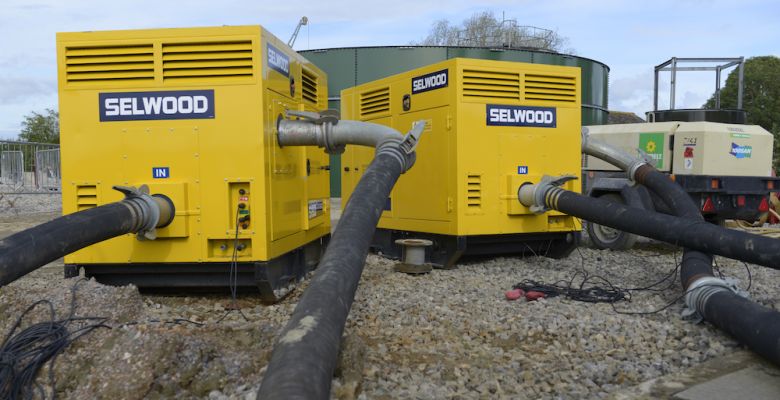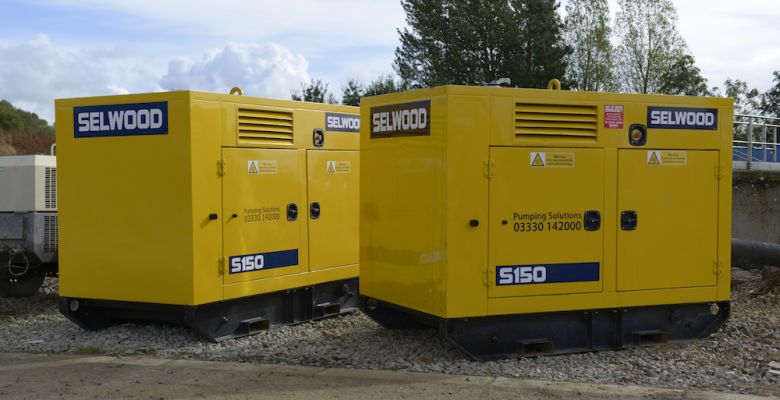Wessex Water’s commitment to minimising the environmental impact of its operations was a key driver behind its decision to carry out major improvement works at a major Water Recycling Centre (WRC).
Wessex Water’s Engineering and Sustainable Delivery (ESD) team, delivering its AMP7 5-year-investment programme, is currently working on improvements to the Marnhull Common Water Recycling Centre in North Dorset.
The project has a number of environmental drivers:
- Recycling of existing assets and tanks resulting in increased storm storage capacity.
- Increasing the overall treatment capacity of the Water Recycling Centre
- Phosphorus/nutrient removal, helping to improve water quality in the river Stour
The Wessex Water team also sought to reduce their carbon footprint during the construction phase, and worked with pumping solutions specialists at Selwood to help achieve this.
During a later phase of the works existing humus tanks, which are used to remove suspended solids in the final effluent, also needed to be significantly modified. This resulted in this critical section of the works having to be over-pumped. This over-pumping allowed the construction team to safely convert the associated outlet pipework and enabled the site team to install level monitoring sensors compliant with the Environment Agency’s Monitoring Certification Scheme (MCERTS).
Phil Ingleheart, Framework Manager and David Petford, Pump Solutions Manager at Selwood Pump Rental Solutions, worked closely with Amber McCrory-Apperley, Trainee Engineer and member of the Wessex Water Carbon Reduction Working Group at Wessex Water, to find a solution that minimises the environmental impact of the works.
Following a full site visit, the Selwood team specified two S150 solids handling pumps powered by HVO fuel, with ancillaries including pipes, fittings and stoppers delivered as a package.
The S150, Selwood’s flagship solids handling pump, is fully compatible with HVO, which reduces greenhouse gas emissions by up to 90%, nitrogen oxides by up to 30% and ultra-fine particulates by up to 85% when compared to red diesel.
Selwood’s pumps are fitted with auto-start and stop systems, so the pumps only operated when the flows were high enough to trigger them, also saving on fuel, cost and emissions.
These measures saved an estimated 2723 kgCO2e of emissions, 98.71% reduction to using red diesel, during the three weeks, the overpumping was in operation at Marnhull. Workers at the site commented on the difference it made to be working close to pumps with virtually no exhaust odour. The success of the project has led to Wessex Water choosing to continue to work with Selwood to use HVO as an alternative fuel.
This ties in with Wessex Water’s route map goal to achieve net zero operational carbon emissions by 2030, and full decarbonisation of all aspects of its work by 2040, a decade ahead of the government’s 2050 target.
Amber McCrory-Apperley said: “Using HVO, with the reductions in carbon emissions and improvements to air quality it brings, has proved to be one way we can massively reduce our environmental impact. In close collaboration with Selwood, we have trialled the use of HVO at Marnhull Common which proved highly successful and has paved the way for Wessex Water and Selwood to develop this approach going forward.”
“Both businesses are currently heavily reliant on fuel, so there are huge benefits of using HVO as an alternative to power our site plant and equipment.”
Phil Ingleheart said: “At Selwood we have underlined our commitment to becoming an industry leader on sustainability, both in the way we operate and in our work with customers and suppliers. Amber and the team at Wessex Water fully embrace this approach and I am delighted that we worked so closely together to deliver a project that has delivered significant improvements at Marnhull WRC in the most eco-friendly way possible.”


